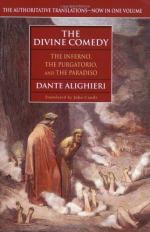“Now lack I satisfaction more,” said I,
“Than if thou hadst been silent at the first,
And doubt more gathers on my lab’ring thought.
How can it chance, that good distributed,
The many, that possess it, makes more rich,
Than if ’t were shar’d by few?”
He answering thus:
“Thy mind, reverting still to things of earth,
Strikes darkness from true light. The highest
good
Unlimited, ineffable, doth so speed
To love, as beam to lucid body darts,
Giving as much of ardour as it finds.
The sempiternal effluence streams abroad
Spreading, wherever charity extends.
So that the more aspirants to that bliss
Are multiplied, more good is there to love,
And more is lov’d; as mirrors, that reflect,
Each unto other, propagated light.
If these my words avail not to allay
Thy thirsting, Beatrice thou shalt see,
Who of this want, and of all else thou hast,
Shall rid thee to the full. Provide but thou
That from thy temples may be soon eras’d,
E’en as the two already, those five scars,
That when they pain thee worst, then kindliest heal,”
“Thou,” I had said, “content’st
me,” when I saw
The other round was gain’d, and wond’ring
eyes
Did keep me mute. There suddenly I seem’d
By an ecstatic vision wrapt away;
And in a temple saw, methought, a crowd
Of many persons; and at th’ entrance stood
A dame, whose sweet demeanour did express
A mother’s love, who said, “Child! why
hast thou
Dealt with us thus? Behold thy sire and I
Sorrowing have sought thee;” and so held her
peace,
And straight the vision fled. A female next
Appear’d before me, down whose visage cours’d
Those waters, that grief forces out from one
By deep resentment stung, who seem’d to say:
“If thou, Pisistratus, be lord indeed
Over this city, nam’d with such debate
Of adverse gods, and whence each science sparkles,
Avenge thee of those arms, whose bold embrace
Hath clasp’d our daughter; “and to fuel,
meseem’d,
Benign and meek, with visage undisturb’d,
Her sovran spake: “How shall we those requite,
Who wish us evil, if we thus condemn
The man that loves us?” After that I saw
A multitude, in fury burning, slay
With stones a stripling youth, and shout amain
“Destroy, destroy:” and him I saw,
who bow’d
Heavy with death unto the ground, yet made
His eyes, unfolded upward, gates to heav’n,
Praying forgiveness of th’ Almighty Sire,
Amidst that cruel conflict, on his foes,
With looks, that With compassion to their aim.
Soon as my spirit, from her airy flight
Returning, sought again the things, whose truth
Depends not on her shaping, I observ’d
How she had rov’d to no unreal scenes
Meanwhile the leader, who might see I mov’d,
As one, who struggles to shake off his sleep,
Exclaim’d: “What ails thee, that
thou canst not hold
Thy footing firm, but more than half a league
Hast travel’d with clos’d eyes and tott’ring
gait,
Like to a man by wine or sleep o’ercharg’d?”




